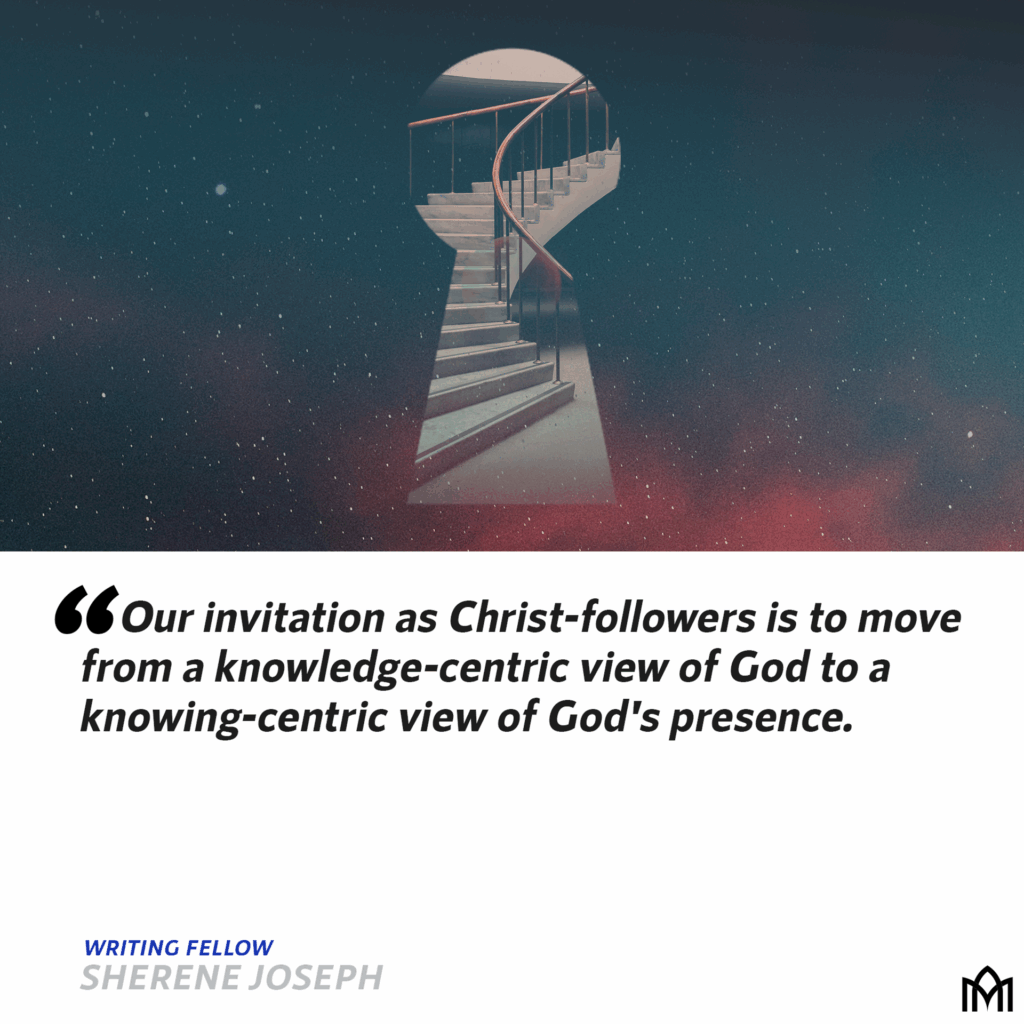An Invitation to Explore the Mystical Heart of God (Pt. 2)
*Editorial Note: Read Part 1 of Sherene’s piece, “An Invitation to Explore the Mystical Heart of God (Pt. 2),” here. ~CK
PART 2
In Revelation, we read that the Apostle John is imprisoned on the island of Patmos. While there he has a mystical vision that is the majority of the book of Revelation. Revelation 1:10 begins this vision: “I was in the Spirit on the Lord’s Day and I heard behind me a loud voice like a trumpet” (Revelation 1:10). In Ezekiel 1:1, the prophet begins his work with a similar mystical experience as the Apostle John: “The heavens were opened and I saw visions of God.” If Scripture texts such as these do not make the case for mysticism, then I am not sure what does. Christian mysticism is real and normative for the follower of God. It is the philosophy and practice of a direct experience with God, as author and pastor Brian Zahnd defines it.1Idea accessed from https://inallthings.org/rejecting-deconstruction-and-welcoming-christian-mysticism-a-review-of-when-everythings-on-fire-faith-forged-from-the-ashes/
Christian mysticism is a spiritual experience akin to something any of us can experience in our walk with God, whether it takes the form of prayer, worship, dreams, visions, or simply being led by the Spirit throughout our days. Even though there are many practical aspects to our Christian faith, we cannot avoid the reality that God is omniscient and omnipresent, which makes us all mystics.
Ancient Wisdom for Modern Times
In his book The Deeper Life: Go Beyond Knowledge to Spirit-Filled Living, A.W. Tozer says, “It is not intellectual knowledge about God that quenches man’s ancient heart-thirst, but the very Person and Presence of God Himself.”2A.W. Tozer, The Deeper Life: Go Beyond Knowledge to Spirit-Filled Living. Chicago: Moody Publishers (2022). 38-39. Our desire grows to see God and live in acute awareness of His presence around us every second of the day, pursuing Him with every fiber of our being. He calls us to abide with Him, to be grafted into Him as a vine branch, focusing our minds not solely on gaining knowledge about God but on God Himself.
A Christian mystic seeks a direct, non-abstract, and unmediated encounter with the Divine. We have the resources at our disposal—Scripture, community, and learning—but a mystic wants to practice the discipline of being united to and with God without any intermediaries. We must let go of our pride, ego, and desire to be in control and allow humility and hope to take their place in our lives.
Above all, the one who is willing to walk in this mystical space is seeking love. In 1 Corinthians 13:12, Paul writes, “For now we see only a reflection as in a mirror; then we shall see face to face. Now I know in part; then I shall know fully, even as I am fully known.” To be fully known is to be fully loved.
I often wonder what it would feel like to be fully known by someone. The closest example we have from the Bible is the sacrament of marriage. Genesis 4:4 says, “And Adam knew Eve, his wife.” The oneness of the relationship between a man and his wife has often been used to describe the union of two becoming one. But even despite the intimacy of the marriage bond, it falls short of adequately depicting the reality of being fully known by God.
Our invitation as Christ-followers is to move from a knowledge-centric view of God to a knowing-centric view of God's presence. Share on X
In The Way of the Heart, Henri Nouwen writes,
“During the last decade, many have discovered the limits of the intellect. More and more people have realized that what they need is much more than interesting sermons and interesting prayers. They wonder how they might really experience God.”3Nouwen, Henri J. M., The Way of the Heart: Desert Spirituality and Contemporary Ministry. United Kingdom: Darton, Longman and Todd, (1984). 75-76.
Nouwen wrote the above passage in 1981. It rings equally true in 2025.
Julian of Norwich (1343-1413) is considered the most popular of English mystics. She lived as a Benedictine nun, and her theology is based on her mystical experiences. Struck seriously ill at the age of 30, she prayed for a vision amid her sufferings. One of her most significant writings is Revelations of Divine Love. In her first revelation, she is shown a perfect round hazelnut in the palm of her hand, a nut she was familiar with. She writes this as she gazes at it:
“I looked at it with the eye of my understanding and thought: What can this be? I was amazed that it could last, for I thought that because of its littleness, it would suddenly have fallen into nothing. And I was answered in my understanding: It lasts and always will because God loves it, and thus everything has being through the love of God. God made it, God loves it, and God preserves it.”4Norwich, Julian of. Revelations of Divine Love. United States: Dover Publications, 2019. Chapter 5, p. 10.
Although “mysticism” can be a loaded term, writers such as Henri Nouwen and Julian of Norwich show us that it is the most accurate word to use when contemplating God and knowing Him fully. Our invitation as Christ-followers is to move from a knowledge-centric view of God to a knowing-centric view of God’s presence.
We need this ancient wisdom. We need to let go of our pragmatic desire to understand God and be willing to be completely overwhelmed by Him and His glory.
Christian mysticism is real and normative for the follower of God. It is the philosophy and practice of a direct experience with God, as author and pastor Brian Zahnd defines it. Share on X
Returning to My Upbringing
As I have wrestled with my desire for knowledge and understanding over the years, I have also found myself desperate for answers. Looking back at the faith of our Grannies, we can often see how they lived their lives trusting in God without constantly searching for a logical way to explain His goodness. Perhaps this is where the answer lies.
I have realized that the only thing I can do is surrender. I surrender my need for control and certainty in this life. I need God—all of Him, in whatever way He chooses to reveal Himself to me. My life is all the richer because I want to trust in His mysterious nature.
And so, this is what I would tell my friend Alex, who asked me the question about the supernatural nature of God in the first place. Alex’s question sent me on a journey to reflect on God’s consistent and steady nature, and my fluctuating but growing desire to know God more deeply while not always understanding everything:
“We surrender, Alex; we surrender it all. God’s ways are not our ways, and beyond our comprehension, so we live our lives constantly aware of His presence and increasingly attuned to Him. As St. Augustine says, ‘Thou hast made us for thyself, O Lord, and our hearts are restless until they rest in thee.’”
Yes Lord, I want this. I want you.
///
A Christian mystic seeks a direct, non-abstract, and unmediated encounter with the Divine. Share on X
*Editorial Note: Sherene’s first piece for Missio Alliance as a 2024 Writing Fellow was entitled Spiritual Formation in My Mundane (Actual) Life. ~CK




